
Remembering Don Hall
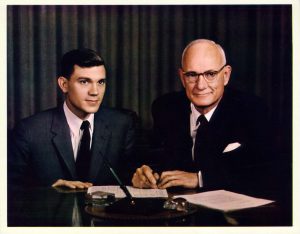 Hallmark chairman emeritus Donald J. Hall, who as chief executive officer from 1966 to 1986 led the company through its greatest period of growth and whose passion for his hometown fueled civic initiatives that changed the face of Kansas City, has died. He was 96.
Hallmark chairman emeritus Donald J. Hall, who as chief executive officer from 1966 to 1986 led the company through its greatest period of growth and whose passion for his hometown fueled civic initiatives that changed the face of Kansas City, has died. He was 96.
Son of Hallmark founder J.C. Hall, Don Hall guided the company from its entrepreneurial roots into the world’s largest greeting card company. Under his leadership, Hallmark introduced new product categories, entered international markets, developed Kansas City’s Crown Center and acquired Crayola, the children’s creative expression company.
“My grandfather took the germ of an idea – that he could help people form connections with one another – to create this company,” said Don’s son and executive chairman Donald J. Hall, Jr. “My father built on that foundation with a passion for the value of our products, faith in the people who develop them, commitment to quality and integrity, and appreciation for the community that nurtures and enables our success. Today we feel an enormous sense of loss, but also a deep appreciation for the legacy he has left to us all.”
Steward of the family business
Don spent his life in and around Hallmark. As a 17-year-old high school graduate and as a student majoring in economics at Dartmouth College in Hanover, New Hampshire, he worked nearby sales territories as an assistant salesman.
After graduation from Dartmouth, Don joined the U.S. Army, serving much of his military career as an officer at a post in Gifu, Japan. 1953 was eventful for Don. He married Adele Coryell that year, and also returned to Hallmark, working in several areas of the company before being named president and chief executive officer in March 1966, and chairman in June 1983.
He served as chief executive officer until 1986 and as chairman until 2016. After assuming the role of chairman emeritus in 2016, he remained close to the company, its people and its philanthropic priorities until his death.
“Phenomenal growth, strong ethical compass”
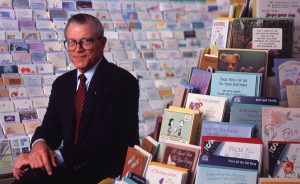 Under his leadership, the company’s revenues grew from nearly $150 million in 1966 to a multi-billion-dollar enterprise today. He oversaw the creation of many of today’s popular card lines, including the Shoebox humor card line, and recognized the importance of introducing offerings designed for African-American, Hispanic and Jewish consumers. He also expanded the company’s reach into international markets and relevancy among global audiences. As a result of his vision, Hallmark today publishes cards in more than 30 languages and distributes them in more than 100 countries.
Under his leadership, the company’s revenues grew from nearly $150 million in 1966 to a multi-billion-dollar enterprise today. He oversaw the creation of many of today’s popular card lines, including the Shoebox humor card line, and recognized the importance of introducing offerings designed for African-American, Hispanic and Jewish consumers. He also expanded the company’s reach into international markets and relevancy among global audiences. As a result of his vision, Hallmark today publishes cards in more than 30 languages and distributes them in more than 100 countries.
While Don grew the traditional greeting card business, he also diversified the company’s product offering. Strategic extensions including Keepsake Ornaments, candles, puzzles and gift books helped the company grow both its consumer base and network of independent retailers. He also oversaw the acquisition of complementary companies to reach new audiences and channels of distribution. Those businesses include the Crayola brand, which became part of Hallmark in 1984 and has since grown into a portfolio of art tools, crafting activities and creativity toys. Through every expansion, he maintained the commitment to quality that the Hallmark brand had stood for since the very beginning.
The Hallmark Hall of Fame, for 65 years one of television’s most honored and enduring dramatic series, was a particular passion, with Don maintaining his father’s commitment to high-quality, life-affirming family entertainment.
As chairman, Don headed the company’s board of primarily outside directors, and maintained a strong focus on product quality and issues affecting employee benefits and work environment. He also chaired the Hall Family Foundation, one of the region’s leading philanthropic organizations formed out of the estates of his parents.
Building a better Kansas City
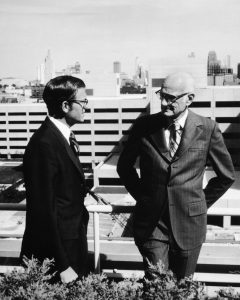 Don’s influence also was felt – most often in the behind-the-scenes roles he favored – in “virtually every major civic initiative in Kansas City since the 1960s,” said Bill Hall, past president of the Hall Family Foundation and no relation to Don Hall.
Don’s influence also was felt – most often in the behind-the-scenes roles he favored – in “virtually every major civic initiative in Kansas City since the 1960s,” said Bill Hall, past president of the Hall Family Foundation and no relation to Don Hall.
Starting in the late 1960s, the vision of Don and his father J.C. Hall led to the development of the Crown Center complex, a “city-within-a-city” on the land surrounding Hallmark’s headquarters in Kansas City. As an early example of urban revitalization and one of the nation’s first mixed-use redevelopments, this project turned a blighted 85-acre section of the city into a thriving retail, residential, office and entertainment complex that today welcomes more than 5 million visitors each year.
With fellow civic leader Charles Kimball, Don instigated the 1970s Prime Time news effort that gave Kansas City a burst of national attention and was credited with attracting the 1976 Republican National Convention to Kansas City. He also brought civic interests together to establish the Kansas City Neighborhood Alliance, the Kansas City Minority Supplier Development Council (later the Mid-America Minority Business Development Council), and the Kansas City Area Development Council.
“He was deeply committed to the Kansas City community, understanding the importance of giving back and fostering inclusive prosperity,” noted son David E. Hall, Hallmark’s executive vice chairman of the board. “He took special pride in his work with the Minority Supplier Development Council. He firmly believed it was essential for the business community to contribute toward a better future for everyone.”
Don was chairman of the local council in its early years, and later joined the board of the National Minority Supplier Development Council.
Behind the scenes influence
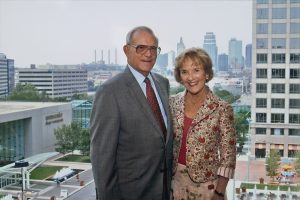 Don and his late wife, “best friend” and life partner, Adele, were long-time supporters of the Nelson-Atkins Museum of Art, regarding it as a civic treasure showcasing art that inspires insights about different cultures. He was also a steady supporter of human service organizations, and joined other civic leaders to help launch the Kansas City area’s life sciences initiative. He was involved in efforts to gain National Cancer Institute designation for the University of Kansas Cancer Center, to establish the Children’s Research Institute at Children’s Mercy Hospital and to champion decades of Hallmark’s support for the United Way fund drive.
Don and his late wife, “best friend” and life partner, Adele, were long-time supporters of the Nelson-Atkins Museum of Art, regarding it as a civic treasure showcasing art that inspires insights about different cultures. He was also a steady supporter of human service organizations, and joined other civic leaders to help launch the Kansas City area’s life sciences initiative. He was involved in efforts to gain National Cancer Institute designation for the University of Kansas Cancer Center, to establish the Children’s Research Institute at Children’s Mercy Hospital and to champion decades of Hallmark’s support for the United Way fund drive.
He also was a decades-long member of St. Andrew’s Episcopal Church.
“Don’s approach to civic and charitable endeavors reflected his personal style,” said Bill Hall. “When he saw a need, he developed an organization to serve the need, gathered others around to help support it, then gave both his time and his financial support – without drawing a lot of attention to himself.”
While his efforts led to numerous honors and awards during his lifetime, his greatest satisfaction was making a positive difference in the community.
His work had national impact as well. In 1990 he was appointed by President George H.W. Bush to serve on the President’s Committee on the Arts and Humanities, and he chaired the group in 1992. He received a National Medal of Arts from President Ronald Reagan in 1985. In 1982, the Academy of Television Arts and Sciences honored him with a Governor’s Award for Hallmark’s contributions to the medium of television though the Hallmark Hall of Fame. He was a director of the Federal Reserve Bank of Kansas City from 1974-1976.
Steady and principled
Under Don’s leadership – continuing a course set by his father and advanced today by his sons and the leadership of the company – Hallmark’s business decisions consistently centered on a set of beliefs and values that he broadly charged everyone at Hallmark with following.
“My father was a man of principle,” said his son Don. “His dedication to Hallmark’s purpose of enriching people’s lives is a reflection of our brand and of our people today.”
The next generation
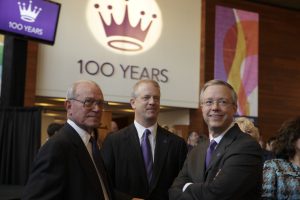
Don took pride in seeing sons Don and David assume leadership positions in the company. He often said that it was never a given that a third generation of Halls would be at the helm; whoever succeeded him must demonstrate acumen and passion for the business, and embrace its core values as well.
“That all three of his children did, and that his sons would step up to company leadership while his daughter assumed a leadership role in community endeavors, was an immense source of pride to him,” said Bill Hall.
Don was married to his wife Adele for 60 years until her death. He is survived by a large and loving family: sons Don and Dave Hall (Laura), and daughter Margi Hall Pence (Keith), grandchildren Helen Hall, Will Hall, Rebecca Hall Coulson (Harper), Allison Hall, Katie Hall, Julia Hall, Sarah Pence, Andy Pence (Megan), and Michael Pence (Jillian). He cherished the mayhem lovingly provided by his eight great-grandchildren: Adele, Jack, Izzy, Charlotte, Sophie, James, Remi and Coco.
.
